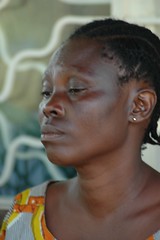I see construction workers and gardeners. Freddy and Pascal see peasants who are overworked, under paid and live on the edge of vile servitude.
This is an interesting contrast, to say the least. With my highly American eyes, I envy the gardener who digs in the hillside on a gorgeous, sunny day. It’s exercise, it’s creating something beautiful and, in America, it pays (relatively) well. He’s not trapped in an office, wiling away his hours in front of a light-box, letting his legs atrophy with lack of movement.
Right, Jules. We’re not in America. This is Africa. And, in Africa, the gardener whom I envy may be sweating bullets just to get a 1 minute break. His boss may berate him, publicly, if he finds him taking even a 5 minute sit-down.
The construction workers who swarm the many-leveled building that rises up somewhere between the bustling corridors of Kiira Road and Upper Mulago Hill Road–between the beautiful and wealthy Kololo District and the esteemed hospital district of Mulago; where young school children, dressed in immaculate, crisp, navy blue uniforms, carry snacks and goodies on their way home–too many of these construction workers toil from sun-up to well beyond sunset (often as late as 11 p.m. or 12 a.m.) The pay: maybe 3000 Ugandan Shillings (USh). Translation: Just under $2.00 U.S. Dollars (USD). For ONE day.
Now factor in that a 1.5 liter bottle of clean water costs, on average, 1000 USh. Or that one egg is 200 USh. According to Freddy, these men–these peasants–rarely get work breaks, and you can see how closely they ride the line of slave labor.
Freddy and Pascal are working, tirelessly (on some nights, getting only one hour of sleep) to attain the rights of these peasants that have migrated to or sought refuge in Kampala. Most often, they are here to seek wealth or sustenance or, simply, life. But, instead, these people who were outcast in their homelands, or who simply wanted to forge a better life, are finding that the discrimination, poverty and real danger they felt at home is not that far from them, even in the safety of Kampala. Ignorance about indigenous people is rampant, with folks easily accepting that pygmies are a curse and refugees are no more worthy of a good job than a dog on the side of the road. The paradigm must shift here in Africa if everyone is to be free to earn enough, live well enough, and say what they want to the world and their governments.

Espe, a Congolese refugee in Kampala, stoically awaiting aid
As Freddy, Pascal and I stroll by the open-air market on our way home, they scoff at the prices they are charged for foodstuff. Again, my American eyes bulge, in awe of how cheap everything is. “Juliet, it’s all relative. That man on that construction platform may not even be able to afford one bunch of bananas.” I am growing new, worldly eyes, even as I write this.
Posted By Juliet Hutchings
Posted Jun 20th, 2008


6 Comments
Gail Green
June 21, 2008
It is quite a shift, indeed! I remember over 40 years ago being in Brazil and seeing the same situation, of costs low for Americans and foreigners but for Brazilian workers it was hard to eat and pay rent. Or get medical help when needed. Or to buy school books or clothes to wear to school…… and on and on. Your experience in Africa saddens me in that the more things change, the more, for the poor, things stay the same or worsen. You rock, Jules, for being there and trying to help and to tell the stories that need to be told. You go, girl!
Herbert Parsons
June 22, 2008
Juliet, I read down your blog and as I came to your moving portrait of Espe, Eric Bibb was bluesing softly on the radio. Really got to me.
Thank you for reminding us of different realities, different truths. Herb
Patricio Chile , Media Assistant
June 23, 2008
Juliet, great post. One thing I love about foreign travel is the opportunity to put everything in its true perspective. We often take what we have for granted. Keep up the good work and keep us informed!